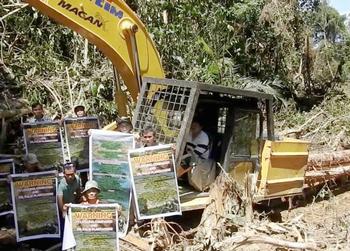
MULU, Sarawak, Malaysia, February 21, 2019 (ENS) – Sarawak Deputy State Assembly Speaker Datuk Gerawat Gala today gave official notice to the oil palm plantation giant Radiant Lagoon to immediately stop clearing the forests on the fringes of Gunung Mulu National Park on the island of Borneo.
Gala issued the order following widespread human blockades set up by hundreds of indigenous people from the Penan and Berawan communities to protest the forest clearing in the Malaysian state of Sarawak.

Until Gala’s order, Malaysian oil palm company Radiant Lagoon had continued to log the Mulu forests, despite protests by the local communities and international outrage over the destruction of forests near Gunung Mulu National Park.
Sarawak’s most popular tourist attraction, Gunung Mulu National Park, is endangered by the 4,400 hectare oil palm plantation being carved out of the Mulu forests that will impede wildlife moving between the national park and the primary forests of Brunei.
Penan and Berawan community reports received by the Swiss environmental advocacy group Bruno Manser Fund say that, “…the loggers have increased the pressure on the forest in an apparent attempt to create facts on the ground before politicians will stop them.”
The communities provided new footage and pictures of logging activities on the ground to the Swiss-based nonprofit BMF, named for Bruno Manser, the Swiss citizen who disappeared in Sarawak in 2000 and is presumed dead. From 1984 to 1990, he stayed with the Penan tribe in Sarawak, organizing several blockades against timber companies.
Now in 2019, the Penan are still fighting to keep their forests from being cut down. Some of the 16,000 remaining Penan are still nomadic hunters and gatherers, but many live impoverished in government resettlement camps or struggle to learn a settled lifestyle and learn farming, which they must do more and more as their forests dwindle.

Penan leader Komeok Joe said on Thursday, “If Radiant Lagoon doesn’t stop logging and keeps converting our forest into an oil palm plantation, we the Penan will have no way to survive. We need the forest for our food supply and to pursue our traditional way of life.”
“The Sarawak government must intervene immediately and stop the destruction of the Mulu forest,” Joe demanded. “Our Native Customary Rights over the forest must finally be recognized.”
Meanwhile, Berawan leader Willie Kajan reported that the Kampung Melinau community filed a police report against Radiant Lagoon over the desecration of a 300-year old Berawan and Tering gravesite in the forest.
By Thursday evening, 16,000 people had signed a petition by Bruno Manser Fonds that calls on the Sarawak state government to revoke the Radiant Lagoon concession and to issue a moratorium on the conversion of forests into oil palm plantations.
Bruno Manser Fund is demanding that the Sarawak state government recognize the Mulu natives’ rights and immediately halt logging in the area.
The area being logged for palm oil is near one of the most outstanding landscapes on Earth, which features the world’s largest caves and shelters some of the most critically endangered species.
Located near the border of the state of Sarawak and the country of Brunei to the north, the Gunung Mulu World Heritage Site was listed by the UNESCO World Heritage Committee in November 2000; it is now also a national park.

The World Heritage listing describes the land, “Gunung Mulu National Park is an area of exceptional natural beauty, with striking primary forest, karst terrain, mountains, waterfalls and the largest caves on earth.” The Sarawak Chamber, 600 m by 415 m and 80 m high, is the largest known cave chamber in the world.
Important both for its high biodiversity and for its karst features, the 52,800-hectare park contains the most studied tropical karst area in the world.
The park contains 17 vegetation zones, with 3,500 species of vascular plants. Its palm species are exceptionally rich.
The park shelters 81 species of mammals, 270 species of birds, 55 species of reptiles, 76 species of amphibians and 48 species of fish as well as over 200 species of cave-dwelling creatures.
All of this natural beauty has attracted tourists, who have improved in the economy of the Mulu World Heritage Area, where travelers can find bungalows and a hotel, book tours and guided walks and enjoy the Discovery Center.
Copyright Environment News Service (ENS) 2019. All rights reserved.
© 2019, Environment News Service. All rights reserved. Content may be quoted only with proper attribution and a direct link to the original article. Full reproduction is prohibited.
